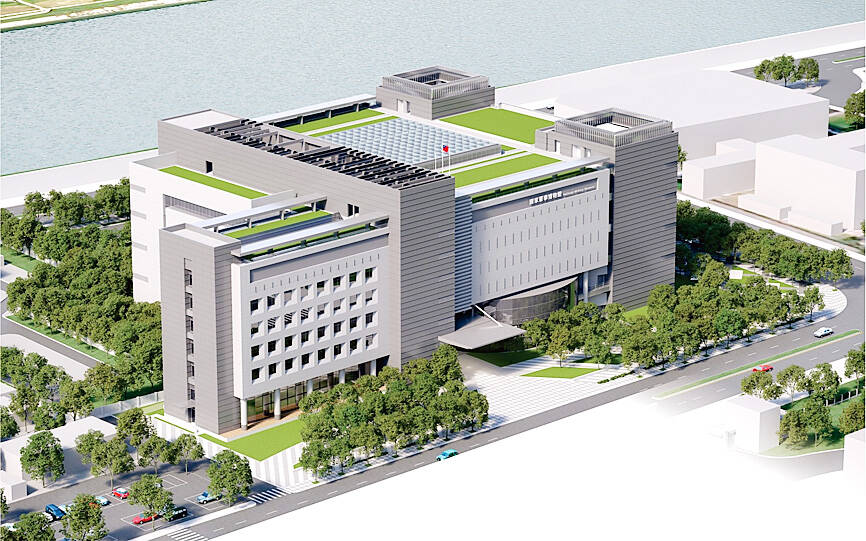Plans for a military museum that is being built in Taipei have drawn criticism for focusing on the military’s roots in China rather than Taiwan’s local history.
The National Military Museum, which is undergoing construction in the city’s Zhongshan District (中山), is to demonstrate the history of the nation’s armed forces from its inception in China to the modern age, a Ministry of National Defense report to the Legislative Yuan said.
The historical narrative is to be composed of three parts, starting with the military’s founding in China, its activities through the Cold War after its retreat to Taiwan and the armed forces in the modern age, the report said.

Photo courtesy of the Ministry of National Defense
The narrative’s silence about Taiwan’s military history prior to the arrival of Chinese nationalist forces reflects the tension between settler and localist historiography that continues to cause strife in Taiwan, Hung Chih-wen (洪致文), former chairman of the Taiwan Railway Museum Preparatory office, said on Tuesday.
The military understandably wishes to maintain the narrative that its history began with the Whampoa Military Academy in China, but having a museum that overlooks parts of Taiwanese history would create blind spots, said Hung, a professor at National Taiwan Normal University’s Department of Geography.
The museum would not address wars predating the retrocession that had a profound effect on Taiwanese historical experience, which should be the aim of a national-level military museum, he said.
Another subject that the museum overlooks is the presence of US military bases in Taiwan that changed so many lives, he said.
“The National Military Museum needs to decide if it is a museum for the armed forces alone or one that explores the impact of military activity on the entire society,” he said.
The planned museum lacks a critical perspective on the history of Whampao, and the military’s participation in atrocities and human rights violations during the White Terror era, Lo said.
That the uniform of major-general Peng Meng-chi (彭孟緝) — who ordered troops to fire on civilians in Kaohsiung during the 228 incident — would be on display at the museum shows that its planners refuse to confront the negative aspects of the military’s history, he said.
The armed forces have done a lot of good for the nation, but it would not truly be a Taiwanese military until it acknowledges its past mistakes, he said.

Taiwan is to have nine extended holidays next year, led by a nine-day Lunar New Year break, the Cabinet announced yesterday. The nine-day Lunar New Year holiday next year matches the length of this year’s holiday, which featured six extended holidays. The increase in extended holidays is due to the Act on the Implementation of Commemorative and Festival Holidays (紀念日及節日實施條例), which was passed early last month with support from the opposition Chinese Nationalist Party (KMT) and Taiwan People’s Party. Under the new act, the day before Lunar New Year’s Eve is also a national holiday, and Labor Day would no longer be limited

Taiwan is to extend its visa-waiver program for Philippine passport holders for another year, starting on Aug. 1, Minister of Foreign Affairs Lin Chia-lung (林佳龍) said on Friday. Lin made the announcement during a reception in Taipei marking the 127th anniversary of Philippine independence and the 50th anniversary of the establishment of the Manila Economic and Cultural Office (MECO) in Taiwan, the Ministry of Foreign Affairs said. The decision reflected Taiwan’s commitment to deepening exchanges with the Philippines, the statement cited Lin as saying, adding that it was a key partner under the New Southbound Policy launched in 2016. Lin also expressed hope

Costa Rica sent a group of intelligence officials to Taiwan for a short-term training program, the first time the Central American country has done so since the countries ended official diplomatic relations in 2007, a Costa Rican media outlet reported last week. Five officials from the Costa Rican Directorate of Intelligence and Security last month spent 23 days in Taipei undergoing a series of training sessions focused on national security, La Nacion reported on Friday, quoting unnamed sources. The Costa Rican government has not confirmed the report. The Chinese embassy in Costa Rica protested the news, saying in a statement issued the same

Temperatures in New Taipei City’s Sindian District (新店) climbed past 37°C yesterday, as the Central Weather Administration (CWA) issued heat alerts for 16 municipalities, warning the public of intense heat expected across Taiwan. The hottest location in Taiwan was in Sindian, where the mercury reached 37.5°C at about 2pm, according to CWA data. Taipei’s Shilin District (士林) recorded a temperature of 37.4°C at noon, Taitung County’s Jinfeng Township (金峰) at 12:50 pm logged a temperature of 37.4°C and Miaoli County’s Toufen Township (頭份) reached 36.7°C at 11:40am, the CWA said. The weather agency yesterday issued a yellow level information notice for Taipei, New